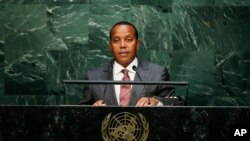The island nation of Sao Tome and Principe, located off the coast of West Africa in the oil-rich Gulf of Guinea, said earlier this month it has agreed to build a deep-sea port in partnership with China. Officials say the port will have economic, not military, aims.
Equity and lease arrangements for the $800 million deep-sea transshipment hub should be finalized with state-owned China Harbor Engineering Company by May 2016.
Sao Tome and Principe Prime Minister Patrice Trovoada told VOA the first stage of construction should be completed by 2018.
"I need revenue to provide health and good quality education. We said let us go to a model where, if we have to raise some debt, it is a sustainable debt. If you look not only at the Gulf of Guinea, but at the maritime route going to South America from Asia, a transshipment hub makes sense, but it cannot be a white elephant. That is why we engaged with this Chinese company," said Trovoada.
The Pentagon considered building its own deep-sea naval facility in Sao Tome a decade ago, given the strategic value of the Gulf of Guinea, which was by 2013 a transit point for around 30 percent of U.S. petroleum imports. The plan did not move forward.
China's increased defense spending and policies, including land reclamation in the South China Sea, have raised concerns about the projection of Chinese military strength to secure Beijing’s global interests.
China's trade with Gulf of Guinea nations exceeded $24 billion in 2013, while the cost of piracy in the Gulf of Guinea has outstripped that of Somalia and the Gulf of Aden since 2012.
But Prime Minister Trovoada insists Chinese military use of the Sao Tome port would have to overlap with the interests of his country and its tradition of working with NATO.
"Everybody has to be together to fight the threat of piracy, terrorism. If China comes to protect what I call common interests, then fine. If there is not a proportion between what they bring in terms of military force, then we need to question that," he said.
The port represents the first direct infrastructure investment by Beijing in Sao Tome and Principe, one of only three African nations – along with Burkina Faso and Swaziland – to extend diplomatic recognition to Taiwan, not China.
Taiwan’s ambassador to Burkina Faso, Shen Chen-hong, says his government is relaxed about the Sao Tome project.
"I do not think it is a problem,” said Shen. "With the current good relations between the People’s Republic of China and Taiwan, we can all do business with Africa. Taiwan will always do its best to help any country realize their economic and development goals if they approach us.”
Trovoada spoke with VOA before flying to New Delhi for this week’s India Africa Forum Summit, seen by analysts as an attempt by India to reinvigorate its challenge to the expanding influence of China in Africa.




